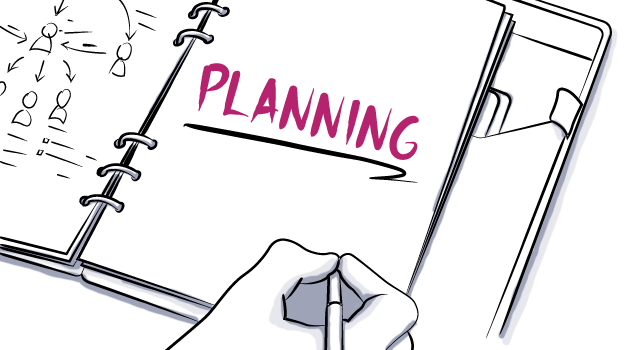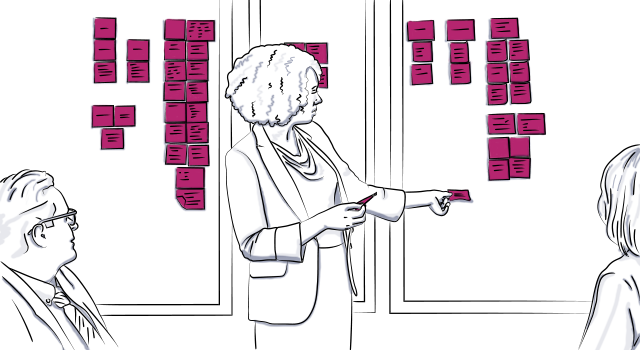
15 Most Common Event Planning Challenges & Their Solutions
Being very event optimistic is a good thing – in fact, 67% of Millennials and 66% of Gen Zers are! But when it comes to event planning, your job is to make sure everything runs smoothly, which is why reviewing these most common event planning problems and solutions will help you be more safe than sorry.
Discover the most common problems & challenges to watch out for as an event planner:

1. Understaffing an event is a common event problem.
Understaffing is a serious problem for events. And it often doesn’t become obvious until the day of, when it’s too late to do anything. So prevention is definitely key.
A recent case study by HR analytics professionals found that the best way to determine optimum staffing levels for any organization or, in this case, event, is to:
- Talk to key stakeholders and get detailed information on what they need help with during the event day(s).
- Writing out each desired role title or function along with a detailed description of what they’ll be responsible for.
- Calculate how many staff members you would need if only 25% of your attendees showed up. Then calculate how many staff members you would need if 75% of your attendees showed up. Hire the median number of people and consider having a few on call.
2. Overspending on the event is a big event challenge.
Budgeting is the number one most challenging aspect of event planning, according to experienced event professionals in this recent survey. So if this is something you’re concerned about, you certainly aren’t alone.
Because lots of little things change or unexpectedly come up during the event planning process, it’s best to keep your expenses modest. Compare previous event budgets and assess what you can do better this time around. Or, if you’re new to event planning, don’t be afraid to ask to see data from the company’s previous gatherings so you can get a feel for how much they typically spend on each occasion.
It’s also important to make sure that you assess all requests for event-related changes through the lens of how it those changes will affect your budget and your timeline. Even if the person making the request is above you, kindly let them know that the event as a whole will be affected and you’ll need to double check all the numbers, just in case.
3. Not prioritizing networking activities is an event challenge.
For business professionals, networking is a primary factor in their decision making when choosing whether or not to attend an event. 41% of active networkers don’t have time to network as frequently as they’d like to and 67% of entry-level job seekers say that networking face to face is more valuable than any other method. All of that just goes to show how important this event component really is.
No matter what you have planned so far, there are plenty of opportunities for networking activities. Regardless of your budget, you may be able to incorporate some of these great ideas:
- An organized happy hour at the end of the programming day.
- Speed networking stations at lunch.
- Social lounges where attendees can kick back between activities and meet new people.
[Tweet “Discover the most common problems & challenges to watch out for as an event planner!”]
4. Forgetting to track schedule or budget changes it an avoidable event problem.
You should feel empowered to approve or reject unforeseen schedule or budget changes as they come up. And when you do approve anything, you have to make sure you follow through and adjust your plans accordingly.
This means following up with key stakeholders, keeping communication to one centralized and accessible platform, and organizing your event project notes so that nothing slips between the cracks.
Experts also suggest using a formal change tracking process when event planning. Having a repeatable system in place lets your clients or company know that no matter what happens they’ll always be kept in the loop and they can trust that you’ll make sure it all works out.
5. Not having a backup plan for bad weather is an event problem.
Extreme weather (think hail storms, tornadoes, and hurricanes) has increased in both frequency and intensity this past decade. Which is why it’s good to err on the side of caution when preparing for your event, even if it’s in beautiful, sunny Southern California during its best weather months.
Whether you need to disaster-proof your outdoor wedding venue or come up with a plan just in case your company cocktail garden party gets rained out, here are some tips for dealing with an unexpected drop-in from Mother Nature:
- Always have a second venue in mind. One that lets you book last minute, is located nearby, and isn’t in high demand this time of year.
- Consider purchasing event or weather insurance in case the event gets postponed or cancelled. This is especially important if your event is selling tickets because guests will need to be refunded.
- Create event plans B, C, D, and E. Fingers crossed they don’t even need to see the light of day. But having them in your back pocket will help you think fast on your feet and show everyone that you’re the event planning superhero we already know you are.
6. Neglecting to leave wiggle room in your event timeline is a problem.
Running out of time is a major event planning problem. But the good news is it’s totally avoidable. Planning fallacy, a psychological phenomenon first coined by experts Daniel Kahneman and Amos Tversky in 1979, is the tendency for humans to forget that things can wrong – especially when it comes to projects that require many different steps and people (ahem, like events).
Fight the urge to under budget your time by getting good at understanding which tasks are important but not urgent. You can also prepare for planning fallacy in other people by giving them strict deadlines and more than enough headway before their part of the decision making or planning process is actually due.
7. Lack of real world work experience can be an event challenge.
This is not a cheap shot at beginning event planners. In fact, arming yourself with this knowledge now might actually save you headaches in the future. Because let’s face it – you’re not going to know what to do in every scenario. But here are some ways you can figure it out on the job:
- Have a go-to resource for event planning news, trends, and education that you can quickly search within for advice as needed.
- Assign one or two unofficial mentors to yourself. Anyone who has event planning experience or is good at improvising solutions to problems can be very helpful when things go wrong. Have their number (or email) on speed dial and make sure you ask for their permission ahead of time.
- Spend your time between events acquiring or refreshing your event planning certifications so that you are as prepared as possible when your next project begins.

8. Having more guests or attendees than you planned for is an event mistake.
Your event is at capacity – time to celebrate! But not before you figure out how they heck you’re going to organize/feed/seat everyone. It’s a best case scenario practically no one plans for (except for you now) but it does happen.
Whether or not you sell out tickets or fill up on registrations ahead of time, experts note that there are plenty of ways to anticipate this major event planning problem, as long as you know what to look for.
Keep a close eye on event forums, social media mentions, and activity on your event app. If the number of people engaging with your event on these platforms is higher than the number of people you were expecting to attend, make sure you adjust your plans accordingly.
9. Not having a structured event management process can be a challenge.
Streamlined workflow, centralized communication, and a scalable event planning process aren’t just buzzwords. They’re the tools you need to maximize your productivity and, ultimately, the success of your event. The good news is there are plenty of free event planning software and tools out there.
10. Forgetting to create an attendee engagement plan for before, during, and after the event is a challenge.
So you’ve planned a perfect event. That’s great! But what about your attendees? If they’re not engaged, then what’s the point?
There are 4 main types of attendee engagement you need to touch on for any event you plan:
- Content involving exhibitions, speakers, and other event activities.
- Connections between attendees and sponsors in genuinely creative and authentic ways.
- Communication regarding event logistics and any questions/comments that come up.
- Engagement between attendees through online forums, in person networking, and community management.
11. Leaving little to no time for event set up or take down is an event mistake.
Attendees will appreciate arriving to an event that is fully ready for them, which is why it is absolutely paramount that you as the event planner give your partners plenty of time – or as much time as the venue will allow – to get everything taken care of. You might even find out that the venue has another event before or after yours which will dictate your hard in or outs.
Details like these can slip through the cracks of any complicated event planning process but thinking ahead and communicating with everyone from the venue relationship manager to your catering company to your signage team will really help make sure the event begins and ends on a high note.
12. Neglecting to research what other local events or laws might affect your gathering is a problem.
An outdoor concert on the lawns of a museum is an amazing experience for attendees. Unless of course they find themselves on a parade route with nowhere to park or, if they make it to the location, any way of comfortably hearing the music. It’s an exaggerated example that hopefully gets the point across: you can’t prevent outside forces from affecting your event but you can certainly plan for them.
Here are some ways to research local area goings ons worth taking note of:
- Google events calendars for your event’s region, city, and neighborhood.
- Ask venue managers if there are any zoning laws you’ll have to abide by.
- Reach out to area event planners through social media and see if they have any war stories they’d like to share about particular areas or event spaces.

13. Failing to capture valuable event data can be an event mishap.
Your event ROI is one of the most important, practical, and effective ways of measuring event success. Without out, you can certainly piece together other key event KPIs to figure out what did or did not go well. But either way, you need data to view all that information.
And it’s not just important for your team. Past and future sponsors will need to see those numbers too. Plus there’s no real way to determine what you can improve on in the future without having a clear record of how effective each event was.
14. Over-programming your event schedule is a problem.
No matter how cool your schedule line up is, everyone needs a little down time here and there. Make sure that your event schedule has plenty of the following:
- Designated free periods where there are no events, activities, or keynotes going on.
- Clearly stated or suggested program lunch breaks.
- Down time that is completely separate from networking events, where your more introverted guests can take a breather.
- Early wrap up times at the end of multi-day events so attendees don’t burn out.
15. Not confirming your vendors can be an event mistake.
This event planning mistake is more common than you might think. In addition to paying your deposit, looping them in on relevant email chains, and confirming your venue set up times, you need to get one final confirmation within 48 hours of the event.
You never know what might come up – whether it’s a personal family matter or a flaky vendor, having written confirmation from all partners is a great way to prevent any misunderstandings. Plus, if something does go wrong, your event insurance company can use that documented communication to help assure them that you did everything in your power to make things work.
Now You’re Ready to Overcome Common Event Planning Challenges!
The good news is there is one common thread connecting all of these top event planning challenges; they are completely avoidable. Whether you use the solutions mentioned above or come up with your own, your event will surely benefit from this new knowledge!
For more event planning advice, check out these great reads:
- 15 of the Best Event Planning Niches
- The Ultimate Party Planning Checklist Template
- How to Create Better Networking Moments at Events

Looking for more information about event planning challenges?
Understaffing, Overspending, Not prioritizing networking, Forgetting to track changes, no weather backup plan, neglecting timeline wiggle room, lack of experience, too many guests, no event management process, forgetting attendee engagement, too little time for setup and breakdown, not researching other events and laws, not capturing data, over-programming, not confirming vendors.
Event planning jobs are expected to grow 7% from 2018-2028, compared to 5% across all jobs, indicating that the industry is growing.
Applying set project management techniques to the development and execution of events.

